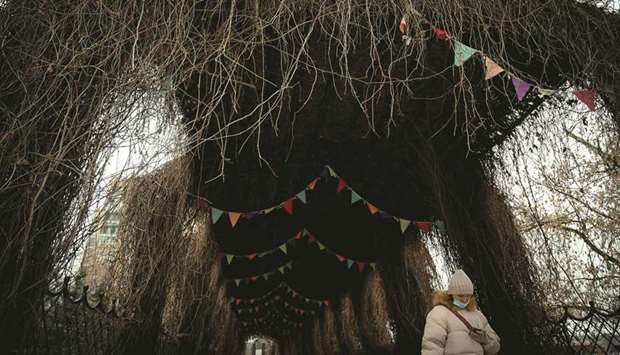Recent progress on coronavirus vaccines is positive but the World Health Organisation (WHO) is concerned that this has led to a growing perception that the pandemic has come to an end, WHO Director-General Tedros Adhanom Ghebreyesus said yesterday.
The highly-contagious coronavirus causes the Covid-19 respiratory disease.
Britain approved Pfizer’s Covid-19 vaccine on Wednesday, raising hopes that the tide could soon turn against a virus that has killed nearly 1.6mn people globally, hammered the world economy and upended normal life for billions.
“Progress on vaccines gives us all a lift and we can now start to see the light at the end of the tunnel. However, the WHO is concerned that there is a growing perception that the coronavirus pandemic is over,” he said.
Tedros said the pandemic still had a long way to run and that decisions made by citizens and governments would determine its course in the short run and when the pandemic would ultimately end.
“We know it’s been a hard year and people are tired, but in hospitals that are running at or over capacity it’s the hardest it can possibly be,” he said. “The truth is that at present, many places are witnessing very high transmission of the coronavirus, which is putting enormous pressure on hospitals, intensive care units and health workers.”
The virus emerged in Wuhan, China, a year ago. Since then more than 65mn people have been reported to be infected by the novel coronavirus globally, and almost 1.6mn have died.
The WHO’s top emergency expert Mike Ryan also cautioned yesterday against complacency in the wake of vaccine roll-out, saying that although they were a major part of the battle against Covid-19, vaccines would not on their own end the pandemic.
“Vaccines do not equal zero Covid,” he said.
Ryan said some countries would have to sustain very strong control measures for some time into the future or they would risk a “blow up” in cases, and a yo-yoing of the pandemic.
“We are in a pivotal moment in some countries. There are health systems in some countries at the point of collapse,” he said, without referring to specific countries.
According to the WHO’s overview of candidate vaccines, 51 are currently being tested on humans, 13 of which have reached final-stage mass testing.
A further 163 candidate vaccines are being developed in laboratories with a view to eventual human trials.
Switzerland meanwhile said that it would allow ski resorts to remain open for domestic tourism but announced some stricter measures including banning singing to control the spread of the coronavirus.
The Alpine country has sought a different path from neighbours Italy, France and Germany, which are keeping winter sports under wraps over the holiday period, while Austria has made ski holidays all but impossible.
Instead, Switzerland said resorts will need local authority approval to open after December 22, a move in line with the country’s middle path of keeping the economy relatively open and relying on the public to comply with anti-coronavirus measures.
Resorts which do not comply with social distancing regulations could have their permits removed, it said.
The Netherlands’ Prime Minister Mark Rutte expressed outrage yesterday after scientists advising the government on managing the Covid-19 pandemic received threats.
Multiple experts on the OMT scientific committee found threatening letters had been left in their letterboxes at home, Dutch media said.
Committee member Andreas Voss told the site he had been called a “horrible monkey” and told to “go back to Germany” in a note addressed to him, according to news website Nu.nl.
Another OMT expert, Diederik Gommers, said that one of his colleagues was under police protection after “serious threats”.
“We are all enormously shocked. These people do a good and important job, and they do it with their souls and their conscience,” Rutte told a weekly press conference.
“People can disagree with our political choices or disagree with the advice (on coronavirus ... it’s fine to discuss the merits,” said Rutte. “But we will never accept intimidation and threats. They are completely unacceptable.”
Other members of the committee told Nu.nl they had been so unsettled by the threats that they are now reluctant to speak to the media about Covid-19.
A spokesman for the RIVM public health body, where the committee is based, declined to comment when contacted by AFP.
In Russia, Muscovites from high-risk groups such as healthcare workers began registering yesterday for jabs of a Russian-made Covid-19 vaccine, two days after President Vladimir Putin called for large-scale vaccinations.
Sputnik V, one of two Russian-made vaccines to have received regulatory approval in Russia despite clinical trials being incomplete, requires two injections.
Interim trials showed it is 92% effective at protecting people from Covid-19.
Mass testing for the second Russian vaccine, EpiVacCorona, began on Monday.
In Italy, more than half of Italians think it is right to give up personal freedom to protect public health, a survey said yesterday, suggesting that the government’s curbs to fight the pandemic still have public support.
Some 57.8% of respondents accept that the government should decide “when and under what conditions they can leave their houses, what they can or cannot do, who they can see and where” to protect health, a survey by Censis research institute said.
The percentage is highest among young people, the survey showed, reaching a peak of 64.7% among those aged between 18 and 34.

A masked woman uses her smartphone as she walks in a park in Moscow yesterday.
